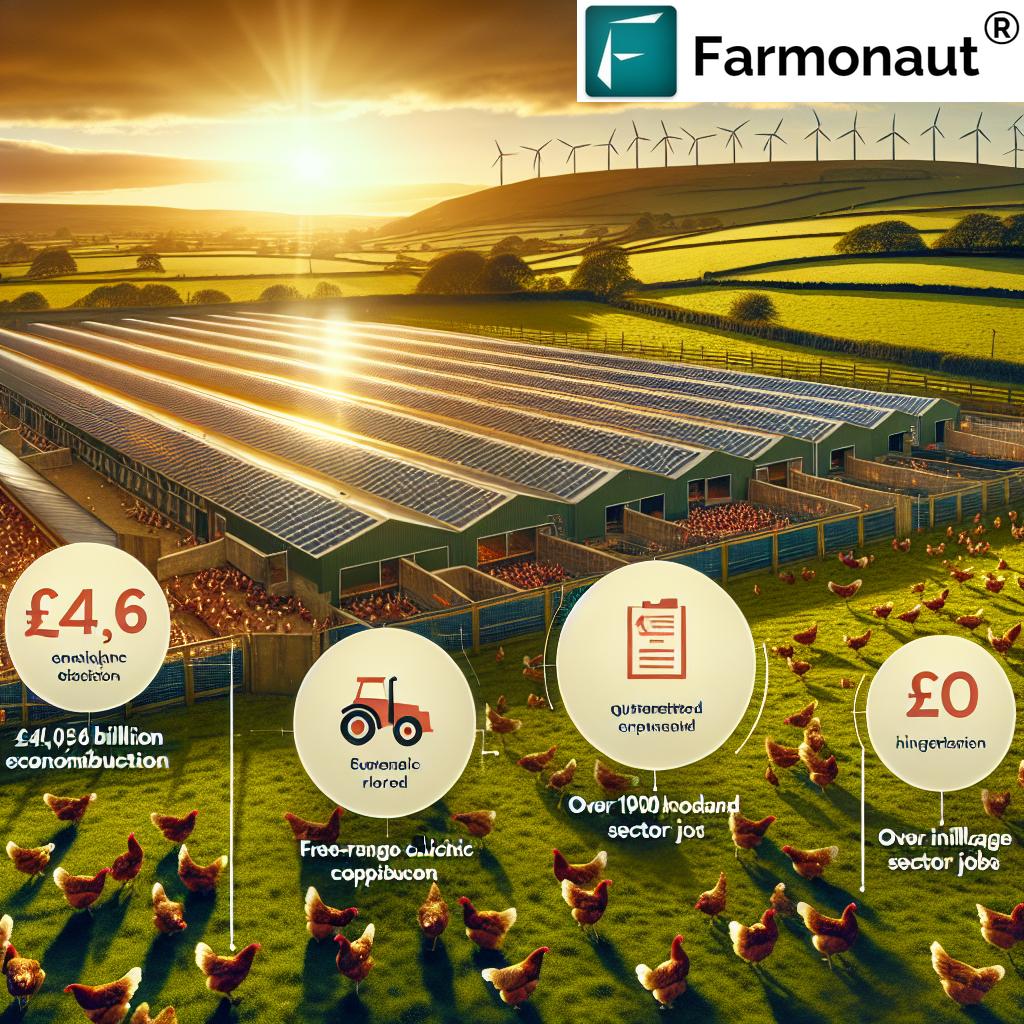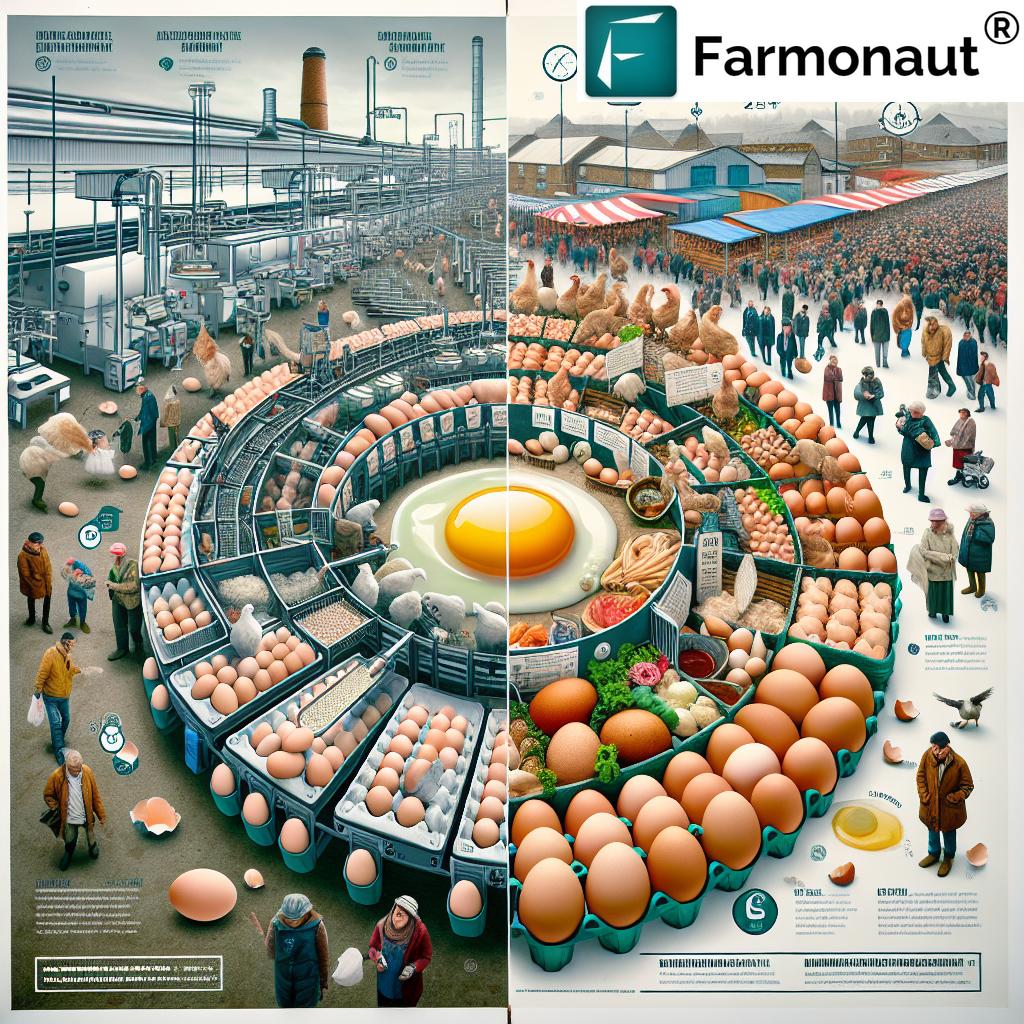Sustainable Poultry Farming: How UK Egg Producers Are Revolutionizing Renewable Energy and Environmental Practices
“The UK egg industry employs over 100,000 people and contributes £4.6 billion to the economy.”
Welcome to our comprehensive exploration of sustainable poultry farming and the revolutionary changes sweeping through the UK egg industry. In this blog post, we’ll delve into the economic impact, environmental initiatives, and innovative practices that are reshaping British agriculture. From farm to table, we’ll uncover how UK egg producers are leading the charge in renewable energy adoption and sustainable farming practices.

The Economic Powerhouse of UK Egg Production
The British egg industry is a cornerstone of the UK’s agricultural sector, playing a vital role in the nation’s economy and employment landscape. Let’s break down the impressive numbers:
- Over 100,000 people employed in the egg industry
- £4.6 billion contribution to the UK economy
- Steady growth in both production and consumption
These figures underscore the importance of the poultry sector not just in terms of food production, but also as a significant driver of economic activity and job creation across the country.
Renewable Energy Revolution in Poultry Farming
“Two-thirds of UK poultry farms generate renewable energy, revolutionizing sustainable farming practices.”
One of the most exciting developments in UK poultry farming is the widespread adoption of renewable energy sources. This shift towards sustainability is not just good for the environment; it’s also proving to be a smart business move for farmers. Here’s how UK egg producers are leading the charge:
- Solar panels on farm buildings
- Wind turbines in suitable locations
- Biomass boilers using poultry litter as fuel
- Anaerobic digestion plants converting waste to energy
By generating their own clean energy, poultry farms are reducing their carbon footprint and operational costs, while also contributing to the UK’s renewable energy goals.
Environmental Initiatives in the Egg Industry
Beyond renewable energy, UK egg producers are implementing a range of environmental initiatives to make their operations more sustainable:
- Water conservation techniques
- Improved waste management systems
- Sustainable packaging solutions
- Precision farming methods to reduce resource use
These efforts are not only reducing the environmental impact of egg production but are also setting new standards for sustainable agriculture across the UK.
Nutrition and Consumption: The Power of Eggs
Eggs are not just an economic powerhouse; they’re also a nutritional powerhouse. Let’s look at some key facts about egg consumption and nutrition in the UK:
- Eggs are an excellent source of high-quality protein
- They contain essential vitamins and minerals
- UK egg consumption has been steadily increasing
- Eggs fit well into various dietary patterns, including vegetarian diets
With their versatility and nutritional profile, eggs continue to be a staple in British diets, supporting both health and the local economy.
UK Poultry Industry Trends
The UK poultry industry is constantly evolving, with several key trends shaping its future:
- Increased focus on animal welfare
- Adoption of technology for improved farm management
- Growing demand for free-range and organic eggs
- Emphasis on traceability and transparency
These trends reflect changing consumer preferences and a growing awareness of the importance of sustainable and ethical farming practices.
The Red Tractor Assurance Scheme
One of the cornerstones of quality assurance in UK agriculture is the Red Tractor scheme. For the poultry industry, this scheme plays a crucial role in maintaining high standards:
- Ensures food safety and traceability
- Sets animal welfare standards
- Promotes environmental protection
- Provides consumer confidence in British eggs
The Red Tractor logo on egg packaging is a sign that the product meets rigorous standards throughout the supply chain.
From Farm to Table: The Journey of British Eggs
Understanding the journey of eggs from farm to table is crucial for appreciating the efforts behind sustainable poultry farming. Here’s a brief overview:
- Egg laying on farms with high welfare standards
- Collection and sorting at packing centers
- Quality checks and grading
- Packaging in environmentally friendly materials
- Distribution to retailers and foodservice
- Final journey to consumers’ homes
At each stage, sustainability and quality are top priorities, ensuring that British eggs meet the highest standards.
Agricultural Social Media Campaigns
In the digital age, social media plays a crucial role in connecting farmers with consumers. UK egg producers and industry bodies are leveraging these platforms to:
- Educate consumers about egg production
- Share stories from farms
- Promote the nutritional benefits of eggs
- Showcase sustainability initiatives
These campaigns are helping to bridge the gap between urban consumers and rural producers, fostering a greater understanding of modern, sustainable farming practices.

The Role of Technology in Sustainable Poultry Farming
Technology is playing an increasingly important role in making poultry farming more sustainable and efficient. Here are some key technologies being adopted:
- Automated feeding and climate control systems
- Real-time monitoring of flock health
- Data analytics for optimized farm management
- Precision nutrition for reduced feed waste
These technological advancements are helping farmers to reduce resource use, improve animal welfare, and increase productivity.
At Farmonaut, we’re proud to contribute to this technological revolution in agriculture. Our satellite-based farm management solutions offer valuable tools for farmers, including real-time crop health monitoring and AI-based advisory systems. While our primary focus is on crop farming, the principles of precision agriculture and data-driven decision-making are equally applicable to the poultry sector.
For those interested in exploring how satellite technology can benefit agriculture, we invite you to check out our services:

Farmonaut Mobile Apps:


UK Poultry Farming Sustainability Metrics
| Sustainability Metric | Current Value | Year-on-Year Change | Industry Target |
|---|---|---|---|
| Renewable Energy Generation (% of farms) | 66% | +5% | 80% by 2025 |
| Carbon Footprint (kg CO2e per dozen eggs) | 2.5 | -3% | 2.0 by 2030 |
| Water Usage (litres per dozen eggs) | 18 | -2% | 15 by 2028 |
| Waste Reduction (% reduction in packaging) | 15% | +3% | 25% by 2026 |
| Feed Efficiency (kg feed per dozen eggs) | 1.6 | -1% | 1.5 by 2027 |
| Animal Welfare Compliance (% of farms) | 98% | +1% | 100% by 2024 |
This table provides a clear overview of the progress being made in key sustainability areas within the UK poultry farming sector. It demonstrates the industry’s commitment to continuous improvement and sets ambitious targets for the future.
The Future of Sustainable Poultry Farming in the UK
As we look to the future, several key areas will likely shape the continued evolution of sustainable poultry farming in the UK:
- Further integration of renewable energy sources
- Development of even more sustainable feed sources
- Advancements in genetic research for healthier, more resilient birds
- Increased use of AI and machine learning for farm management
- Continued focus on reducing carbon emissions across the supply chain
These developments will help ensure that the UK poultry industry remains at the forefront of sustainable agriculture, meeting the growing demand for eggs while minimizing environmental impact.
The Role of Policy in Shaping Sustainable Poultry Farming
Government policy plays a crucial role in driving sustainability in the poultry sector. Some key policy areas include:
- Incentives for renewable energy adoption
- Regulations on animal welfare and environmental standards
- Support for research and development in sustainable farming practices
- Trade policies that support domestic egg production
These policies help create a framework that encourages innovation and responsible practices within the industry.
Consumer Education and Engagement
Educating consumers about sustainable poultry farming is crucial for building support for environmentally friendly practices. Key areas of focus include:
- Understanding egg labels and certifications
- The nutritional benefits of eggs in a balanced diet
- The environmental impact of different farming methods
- How consumer choices can support sustainable farming
By engaging consumers and providing transparent information, the industry can foster a greater appreciation for sustainable egg production.
Conclusion: A Bright Future for UK Egg Production
The UK egg industry is at the forefront of sustainable agriculture, demonstrating that it’s possible to balance productivity, profitability, and environmental responsibility. Through innovative renewable energy solutions, advanced technologies, and a commitment to animal welfare, UK egg producers are setting new standards for sustainable farming practices.
As consumers, policymakers, and industry professionals, we all have a role to play in supporting and advancing these sustainable practices. By choosing British eggs, advocating for supportive policies, and staying informed about agricultural innovations, we can contribute to a more sustainable future for UK agriculture.
The journey towards fully sustainable poultry farming is ongoing, but the progress made by UK egg producers is truly remarkable. As we look to the future, we can be optimistic about the continued evolution of this vital industry, knowing that it’s not just feeding the nation, but doing so in a way that respects our planet and its resources.
FAQ Section
Q: What makes UK egg production sustainable?
A: UK egg production is becoming increasingly sustainable through the adoption of renewable energy sources, improved waste management, water conservation techniques, and a focus on animal welfare. Many farms are generating their own clean energy and implementing precision farming methods to reduce resource use.
Q: How does the Red Tractor scheme ensure egg quality?
A: The Red Tractor scheme ensures egg quality by setting and enforcing standards for food safety, animal welfare, and environmental protection. It provides traceability throughout the supply chain and gives consumers confidence in the quality of British eggs.
Q: What is the economic impact of the UK egg industry?
A: The UK egg industry employs over 100,000 people and contributes £4.6 billion to the economy. It’s a significant sector within British agriculture, providing jobs and economic activity across the country.
Q: How are UK egg producers using renewable energy?
A: Two-thirds of UK poultry farms are now generating renewable energy. This includes the use of solar panels, wind turbines, biomass boilers, and anaerobic digestion plants. These initiatives help reduce carbon footprints and operational costs.
Q: What role does technology play in sustainable poultry farming?
A: Technology plays a crucial role in sustainable poultry farming through automated systems for feeding and climate control, real-time health monitoring, data analytics for farm management, and precision nutrition techniques. These technologies help optimize resource use and improve animal welfare.



